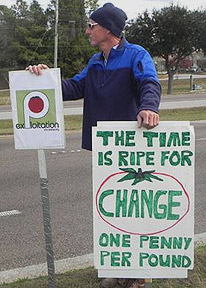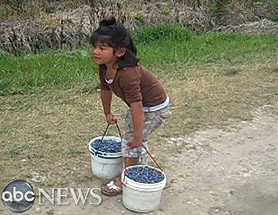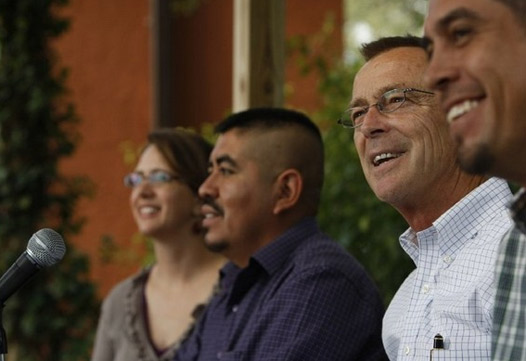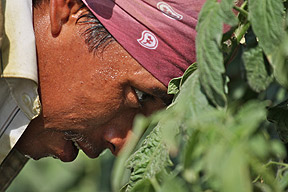 |
|
Pensacola resident Peter Stedman joins the picketing of Publix’s grand opening in Daphne, Alabama. (photo by Devin R. Golden, Baldwin County News)
|
“If there are some atrocities going on, it’s not our business.”
– Publix spokesperson Dwaine Stevens, 12/11/10
Enough is enough! Join us in Tampa this coming March to tell Publix it’s time to listen to consumers and do its part to protect human rights in the fields where it buys tomatoes!
Have the people who run Publix completely lost their minds?
Speaking to a reporter following a protest in Daphne, Alabama, last week, Publix spokesperson Dwaine Stevens actually said these words —“If there are some atrocities going on, it’s not our business” — in response to questions about farm labor exploitation in the grocery giant’s supply chain.
Here’s the passage, from an article in the Baldwin County News, entitled, “Protesters picket Publix’s Saturday grand opening over labor issues” (12/11/10):
| “We don’t have any plans to sit down with the CIW,” Publix’s Media and Community Relations Manager Dwaine Stevens said, also citing that the company sells around 36,000 products in the stores and it cannot get involved with each product’s labor issues. “If there are some atrocities going on, it’s not our business. Maybe it’s something the government should get involved with.” (emphasis added) read more |
So, there you have it. A remarkably honest, almost naked, formulation of Publix’s position on supply chain responsibility. “Atrocities” in our supply chain? Not our business.
Not. Our. Business.
Acceptable atrocities?
Among other things, Stevens’ statement truly begs the question: Are there really no “atrocities” that would give Publix pause?
 Maybe poverty wages, systemic labor abuse, and even slavery in Florida’s fields aren’t atrocious enough. But what about child labor, like that found in the blueberry fields of Michigan (right) in October of last year? What if children were found, in large numbers, picking produce ultimately sold to Publix? Would that be Publix’s “business,” or would they turn their backs on child labor exploitation, too?
Maybe poverty wages, systemic labor abuse, and even slavery in Florida’s fields aren’t atrocious enough. But what about child labor, like that found in the blueberry fields of Michigan (right) in October of last year? What if children were found, in large numbers, picking produce ultimately sold to Publix? Would that be Publix’s “business,” or would they turn their backs on child labor exploitation, too?
One has to assume that Publix would be shocked — shocked! — at such a revelation and quickly move to cut off the offending supplier.
Assuming that’s the case, perhaps Mr. Stevens would like to clarify for its customers just where Publix draws the line between atrocities it finds acceptable and those it does not.
Consumers decide what’s acceptable, not corporations….
Ultimately, however, it doesn’t really matter what Publix thinks is acceptable or not, because, in the end, consumers will decide. And more and more every day, in industry after industry, from apparel to the latest electronics, consumers are holding corporations accountable for exploitation in their supply chains.
That’s why the CIW’s recent agreement with the Florida Tomato Growers Exchange was so widely lauded when it was announced one month ago in Immokalee. The agreement established a first-of-its-kind, industry-wide collaborative effort to eliminate human rights violations in Florida’s tomato fields.
In the joint press release announcing the new agreement, the CIW and FTGE didn’t shy away from the reality of continued problems in Florida’s fields. In the words of Reggie Brown of the FTGE:
| “As we move forward, we can be certain that labor complaints will continue to arise in the foreseeable future, but it is how we deal with these complaints in this new partnership that will serve to demonstrate that we are serious and that our approach is working. As time goes by, we are confident that we will be able to weed out the bad actors and, working together, build a stronger, more sustainable industry that will be better equipped than ever to thrive in an increasingly competitive market place.” read more |
Rather than ignore or deny that unacceptable exploitation exists today in Florida agriculture, the new agreement embraces the challenge of identifying and eliminating farm labor abuse and puts a process in place to do so that taps the unique powers of all the elements of our country’s food industry, from the bottom to the very top:
- of farmworkers, to help expose and fix the worst abuses and apply their unique knowledge toward modernizing, and humanizing, our farm labor system,
- of growers, to continuously improve their operations and meet consumer demand, keeping pace with an evolving marketplace,
- of food retailers, to use their tremendous buying power both to demand higher labor standards of their suppliers and help raise farmworkers out of poverty through a price that supports sustainable production, and
- of consumers, to demand the highest ethical standards for food production.
When corporations step away from responsibility, consumers must step in…
Those last two links in the process are absolutely crucial to its success. In the words of the CIW’s Gerardo Reyes (far right in picture below), during the press conference announcing the agreement with the FTGE:
 “Nearly 50 years to the day since Edward R. Murrow shocked the nation with his landmark report Harvest of Shame – which aired the day after Thanksgiving, 1960 – a solution has appeared on the horizon through the Campaign for Fair Food,” added Gerardo Reyes, also of the CIW. “Nearly 50 years to the day since Edward R. Murrow shocked the nation with his landmark report Harvest of Shame – which aired the day after Thanksgiving, 1960 – a solution has appeared on the horizon through the Campaign for Fair Food,” added Gerardo Reyes, also of the CIW.
“For this new model to achieve its full potential, however, retail food industry leaders must also step up and support the higher standards,” concluded Reyes. “Key players in the fast-food and foodservice industries have already committed their support. It is time now for supermarket industry leaders to seize this historic opportunity and help make the promise of fresh – and fair – tomatoes from Florida a reality.” |
Earlier this year, Secretary of State Hillary Clinton, in presenting the CIW’s Laura Germino with the Trafficking in Persons Hero Award, echoed that same sentiment, speaking about the fight against modern-day slavery:
| “All of us have a responsibility to bring this practice to an end… And we can’t just blame international organized crime and rely on law enforcement… It is everyone’s responsibility. Businesses that knowingly profit or exhibit reckless disregard about their supply chains… all of us have to speak out and act forcefully.” |
But Mr. Stevens’ words leave no room for doubt: Publix has clearly — one might say proudly — abdicated all responsibility for labor conditions in its supply chain. “If there are some atrocities going on, it’s not our business” is perhaps the quintessential expression of reckless disregard.
So this is where you come in.
You are the final link in the process put in place one month ago in Immokalee — the consumer who must actively demand the highest level of ethical standards from the retail food companies that refuse to do their part.
 If we hope to enlist Publix’s support for this emerging Harvest of Hope, we are going to have to lift our campaign to an even higher level. And that is just what we are going to do, with your help.
If we hope to enlist Publix’s support for this emerging Harvest of Hope, we are going to have to lift our campaign to an even higher level. And that is just what we are going to do, with your help.
If you agree with us that poverty wages and abusive working conditions in its supply chain — in its own backyard, no less — are Publix’s business, then join us this coming March in Tampa for the major spring Publix action.
And in the meantime, you can let Publix know that you were as disturbed as we were to read Mr. Stevens’ comments. Send Publix an email today by clicking here.
In the words of the protest sign pictured at the top of this post, “The time is ripe for change” in the US agricultural industry. This holiday season, let’s give thanks to Dwaine Stevens for so boldly clarifying Publix’s true stance on supply chain responsibility. And then let’s organize like never before to change it.
